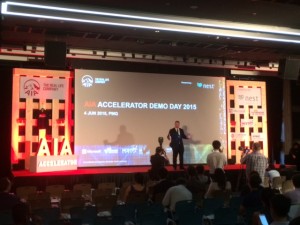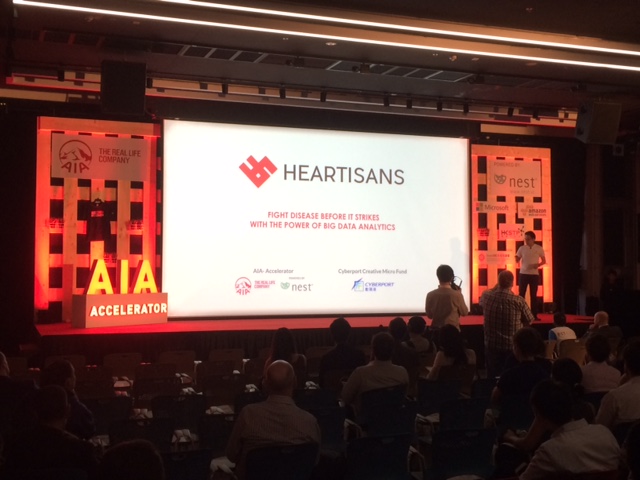 This week, we had the opportunity to meet some amazing startups at the AIA Accelerator Day, which was held at Hong Kong’s cool PMQ complex, a former police dormitory that has been turned into a creative hub full of small, hip clothing boutiques. The event was a combination mini-trade show and pitch session featuring eight promising startups, all focusing on the general topic of health. What is AIA and why healthcare? AIA is the largest insurance company in Asia, having spun off from US parent AIG following the global financial crisis. AIA was a sponsor of the event and a supporter of the companies, which just graduated from the Nest accelerator program in Hong Kong. Although insurance companies are typically very conservative and do not invest in risky startups, AIA developed a good relationship with Nest and also has an interest in promoting health and healthcare. Many of these companies were launched based on experiences from the founders’ lives, and this passion was reflected in their pitches. The startups we met were:
This week, we had the opportunity to meet some amazing startups at the AIA Accelerator Day, which was held at Hong Kong’s cool PMQ complex, a former police dormitory that has been turned into a creative hub full of small, hip clothing boutiques. The event was a combination mini-trade show and pitch session featuring eight promising startups, all focusing on the general topic of health. What is AIA and why healthcare? AIA is the largest insurance company in Asia, having spun off from US parent AIG following the global financial crisis. AIA was a sponsor of the event and a supporter of the companies, which just graduated from the Nest accelerator program in Hong Kong. Although insurance companies are typically very conservative and do not invest in risky startups, AIA developed a good relationship with Nest and also has an interest in promoting health and healthcare. Many of these companies were launched based on experiences from the founders’ lives, and this passion was reflected in their pitches. The startups we met were:
Advanpro has developed a high-tech fabric whose electrical characteristics change when stretched, and its first application is a strap that monitors breathing. The device can be used to monitor breathing activity when sleeping, including diagnosing sleep apnea. Future applications include the fabric’s integration into belts, shirts, bras and footwear.
Auomeo uses a hardware-software combination to compensate for hearing loss and deficiencies in hearing sounds of certain frequencies. Its product consists of a hardware module about the size of a matchbook and a smartphone a
pp. You create a personalized hearing profile for both right and left ears by listening to a series o f tones (like a hearing test), and then the system adjusts the audio from music, TV, cellphones to fit your profile. In our test in a noisy room, music sounded much clearer and cleaner than without. The product will be available via crowdsourcing on June 9 for $99.
Heartisans uses the combination of a heart monitor and data analytics to predict a heart attack before it happens. Patients’ survival rates increase dramatically if they receive CPR or defibrillation soon after suffering cardiac arrest, and the device can suggest measures to take immediately to help fend off an imminent heart attack. Moreover, the company maintains a cardiologist on call to advise patients. The monitor can also detect heart problems such as congestive heart failure.
Prenetics uses pharmacogenomics to analyze our DNA to determine the proper dose of drugs, including those that are ineffective or cause unacceptable side effects, and many adverse effects are caused by improper dosing. The US Food and Drug Administration (FDA) has outlined 130 drugs whose dosage should be modified by pharmacogenetics.
Sanwa Biotech makes a small-sized lab-on-a-chip reader that can sit on a desk in a doctor’s office. It enables rapid diagnoses in the doctor’s office or clinic, eliminating the need to send samples to the lab and wait for them to be processed. Tests can be run in 15 minutes and the company claims they are more than 90% accurate.
Sensible Dynamics makes a sport sleeve that is worn on the ankle to reduce sports injuries. The device leverages Big Data, the Internet of Things, and digital health. We saw demos that used the sleeve, which contains gyroscopes and accelerometers, to monitor an athlete’s form while training or exercising.
Shape is a device the size of a bathroom scale that optically scans your body shape in 3D and stores this data in order to track weight loss and muscle gain, as compared to weighing oneself with a scale or other methods to track body composition. The target market is the USA, specifically California, where weight loss and improving one’s physique are large market opportunities.
Simple Wearables makes a band worn by grandma that senses where and how hard if she has a fall and determines the severity of her injuries. The product is based on the founder’s own experience, where is grandmother fell and refused medical attention, only to die soon after. The product is currently being tested in the Philippines and will be priced at $150 initially plus $24 a year.
These startups all share one quality—the passion of their founders—many of whom created them so that others will not have to go through some of the negative experiences that happened in their own lives. It shows that one can do good while doing well, and the support of AIA is a strong validation of the likelihood of startups’ bright futures.
